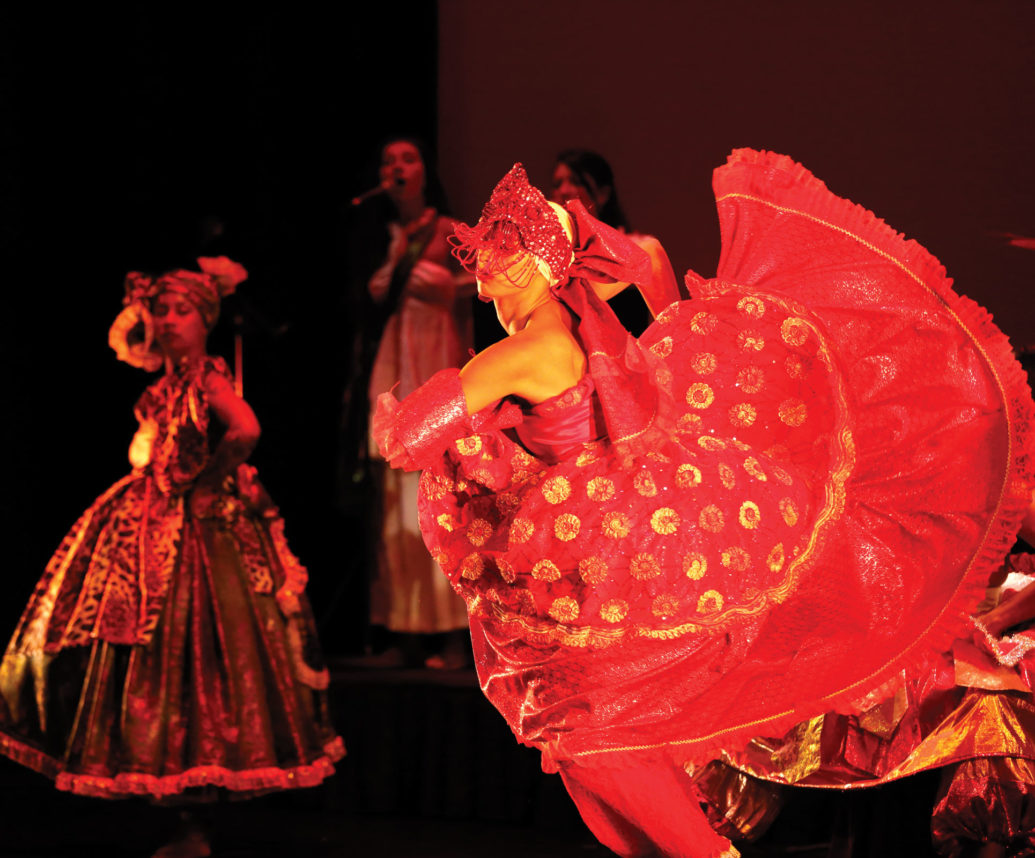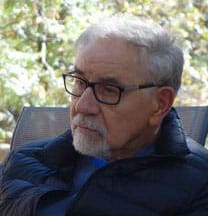 A performance by the Afro-Brazilian dance company Viver Brasil. Photo courtesy of Viver Brasil.
A performance by the Afro-Brazilian dance company Viver Brasil. Photo courtesy of Viver Brasil. The Afro-Brazilian dance company Viver Brasil premiered a dance-and-music performance called “Revealed” at the Dorothy Chandler Pavilion last year — not inside the hall, but in the lobby. The dancers, drummers and singers moved quickly and gracefully up, down and around the carpeted, Y-shaped grand staircase, performing narratives about the Orixás, mythical Brazilian deities derived from African folklore, such as Oba, the hunter-goddess, symbol of the earth’s eternal renewal.
For the audience, standing or shifting about in the lobby, enveloped by the sensual show, it was a taste of what it’s like to be at the intoxicating bacchanal Brazilians call Carnaval — not the fancy tourist spectacle held in Rio, but the people’s celebration in Salvador, in the Brazilian state of Bahia, which is the inspiration for the Los Angeles-based Viver Brasil’s dance, music and storytelling.
Linda Yudin, Viver Brasil’s Jewish co-founder and co-artistic director, said the group will mark its 20th year on Sept. 22 at the Ford Theatres by reprising “Revealed” and performing new dances.
“The show’s called ‘Agô Ayó — Spirits Rising,’ ” Yudin said. “In Yoruba, an African language, agô ayó means ‘permission to be happy.’”
If the 20th anniversary show is like past performances, the dancers, almost all of them women of color, will twirl and stomp robustly in moves that emphasize their connection to the earth and to unseen spirits. Hypnotic sounds of female voices will thread through the percussion landscape like snakes wound around a tree.
There will be masks and costumes featuring colorful flowing skirts, blouses and headgear, as well as symbolic attire invoking the deities of Candomblé, a religion brought to Brazil by African slaves, involving frenzied but controlled movement that allows divine spirits to enter the dancers’ bodies. In Brazil, especially in the northeastern part of the country where a large percentage of the population has African roots, if you scratch the surface of Christianity, you’ll find deep attachment to deities derived from African traditions.
But besides its spiritual and mythical content, Viver Brasil’s shows also have present-day social messages. “Agô Ayó” includes the world premiere of “Cor Da Pele/Skin Color,” a dance choreographed by Marina Magalhaes that, Yudin said, “brings up issues of Black ancestry, what it means to be mixed race in Brazil and elsewhere, and the struggle against anti-Black attitudes.”
Yudin sees a connection between her Jewishness and her Afro-Brazilian work. “Both believe in tikkun olam,” Yudin said. “Candomblé tradition is about caring for the community and caring for others. … Those were the values I grew up with, so there is a lot of similarity.”
Yudin was born and grew up in Danville, Ill., and attended Congregation Israel, a Conservative synagogue. “Interestingly enough, it was a very positive experience growing up in Danville,” she said. “The synagogue experience was very positive. They all knew that Vermilion County was one of the seats of the Ku Klux Klan, but I had a fabulous Jewish upbringing.”

As a young woman, Yudin said she spent “a year abroad in Israel, which turned into several years, from 1977 to 1981, first at Kibbutz Nir David in the Beit She’an Valley, where I studied Hebrew and worked in the fields, orchards and plastics factory.” Yudin said that while there, as well as later when she lived in Jerusalem, she often listened to Brazilian music, including an album sung by Israeli music stars doing their versions of samba and bossa nova.
After returning to the United States, Yudin went to graduate school at UCLA, studying for a master’s degree in dance and ethnography. Recalling the music that had enchanted her when she lived in Israel, she chose to go to Brazil as part of a research project. That first time in Salvador, in 1986, was a life-changing experience: She was overcome by the warmth of the people, the dancing, the music and the myths, and has since returned “about 40 times.”
In the 1990s, Yudin met Luiz Badaró, an accomplished samba dancer and choreographer who had grown up in Salvador and in many ways embodies the culture with which Yudin had fallen in love. They married and in 1997 founded Viver Brasil.
“You know, every Jewish family wants their daughter to marry that good Jewish boy, and I didn’t do that,” Yudin said. “What I feel is that I married the [Afro-Brazilian] culture first and then the man, but this cultural experience has never negated how proud I am to be a Jew.”
Yudin’s Jewishness is expressed, in part, in Viver Brasil’s emphasis on social justice. The last piece in the show at the Ford is called “Bloco Afro Spectacle,” a dance that, according to the program notes, “proclaims, through the thunderous joy of movement and music, the cry for civil rights.”
Yudin said the show at the Ford will take place on the Friday night during the Days of Awe, Shabbat Shuvah.
“There’s no doubt that we are in the middle of the Days of Awe in this world of ours,” Yudin said. “Our contemporary reality is complex, and our show gives voice to Blackness and brownness, and it gives voice to equity. … There are elements where we are going to make the audience thoughtful and maybe even uncomfortable, but it’s important that we raise these issues in our art … and that is the way we contribute to a better humanity.”
“Agô Ayó — Spirits Rising” will be performed Sept. 22 at the Ford Theatres in Los Angeles. https://www.fordtheatres.org/calendar/viver-brasil























 More news and opinions than at a Shabbat dinner, right in your inbox.
More news and opinions than at a Shabbat dinner, right in your inbox.